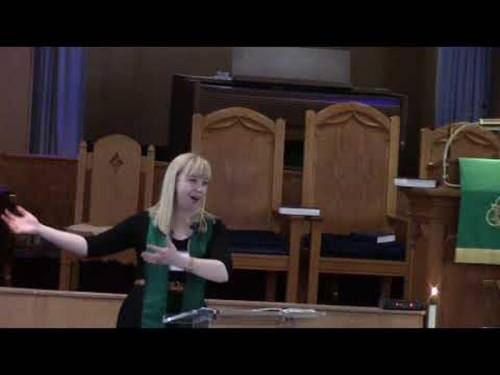How to conduct worship in the coming months largely depends on the local context
by Mike Ferguson | Presbyterian News Service

The Rev. Meagan Manas, pastor of Clinton Presbyterian Church in Clinton, Massachusetts, leads worship pre-pandemic. (Contributed photo)
LOUISVILLE — During a “Church Leaders Vaccine and Regathering” webinar held Wednesday, Massachusetts pastor Meagan Manas laid out ideas for the care of clergy souls while Sean McHugh, a registered nurse in psychiatric medicine, took care of commonly-asked questions about the coronavirus vaccine.
The two appeared as part of the MassSupport Network, which provides free community outreach and support services throughout the Bay State in response to the pandemic.
“A year ago,” noted Manas, the pastor of Clinton Presbyterian Church in Clinton, Massachusetts, about an hour west of Boston, “we were having webinars on what is COVID and what does it mean to still be in community.”
Churches considering in-person or hybrid worship as more and more worshipers and worship leaders become vaccinated have several considerations, according to Manas:
- Risk management. “It will still be some time before anything is safe. What level of risk is acceptable in your community?” Manas said.
- Who is most vulnerable? “We have been asking this in terms of infection and mortality, but we can also ask it in terms of isolation,” Manas said. “If we start worshiping with 10 people and the windows wide open, who needs to be there?”
- What does our faith instruct us to provide as we re-gather? Manas cited 1 Cor. 10:23, a verse she said has informed thinking among members and friends at Clinton Presbyterian Church: “’All things are lawful,’ but not all things are beneficial. ‘All things are lawful,’ but not all things build up.” “What particular values does your community hold dear?” Manas asked. “How can you use those to guide you?”
- How can clergy and worship leaders “lead with intention instead of giving in to burnout?” “If you are like me,” Manas said, “I have been hardcore committed to public health. I have been a wet blanket for months, telling couples they can’t be married in church.” She wondered if similarly situated pastors might decide, “I am tired of that” and will “reach a point where we day, ‘Forget about it, let’s just do it.’”
While high levels of stress are normal and then gone in times of most disasters, including floods and tornadoes, “we are trying to recover while still being in the middle of [the pandemic],” Manas said. It’s common for clergy to experience “emotional outbursts, COVID brain fog, interpersonal difficulties and physical symptoms,” including weight gain. “It can affect us in ways we never imagined.”
Then there’s the stress brought on by clergy and other worship leaders who realize they aren’t creating “high production-value” online worship experiences each and every week. Instead, “We should think, good job! We are surviving a global pandemic,” Manas said.
“This is a time,” Manas said, “to take care of yourself to lead with intentionality and our values.”
When it came time to discuss the vaccine itself, McHugh asked the nearly 30 webinar participants to think of their immune system as a boxer who “doesn’t learn anything until [the boxer] gets into the ring. Once it knows the other person’s moves, it wins.”
The vaccine, McHugh said, is like “a practice opponent for your immune system.” Traditional dead virus vaccines are like punching bags — big and heavy, and they take up lots of space.
But with the latest vaccines, “you just need the part your immune system is trying to punch.” It’s more like a speed bag a boxer uses in training, according to McHugh.
McHugh answered a number of commonly asked questions. No, one can’t get COVID-19 from the vaccine, because it has no live virus. Side effects are “your body testing its defenses,” not an infection.
Yes, it’s possible to spread COVID-19 following vaccination, McHugh said. That’s why the best scientific advice is to continue to social distance, wear a mask and wash hands frequently, even after two weeks have elapsed since the second Moderna or Pfizer vaccination.
No, the mRNA vaccines currently being used can’t affect our DNA, because they don’t interact with our DNA. And no, development of the vaccine wasn’t rushed, “not in any way that affects safety,” McHugh said.
Yes, the vaccine will work on the new variants, although less well on the South African variant. “COVID will have to change a lot more to get around this protection,” McHugh said, although “it’s possible future variants might be less susceptible,” such as the Brazil variant. That’s why rapid vaccination is important, McHugh said.
Manas drew the hour-long webinar to a close with a prayer, telling God, “In your sight is the end of this pandemic. Remake us in your image, doing all we can to make sure no one is lost. Give us clear paths in our discernment.”
![]() You may freely reuse and distribute this article in its entirety for non-commercial purposes in any medium. Please include author attribution, photography credits, and a link to the original article. This work is licensed under a Creative Commons Attribution-NonCommercial-NoDeratives 4.0 International License.
You may freely reuse and distribute this article in its entirety for non-commercial purposes in any medium. Please include author attribution, photography credits, and a link to the original article. This work is licensed under a Creative Commons Attribution-NonCommercial-NoDeratives 4.0 International License.